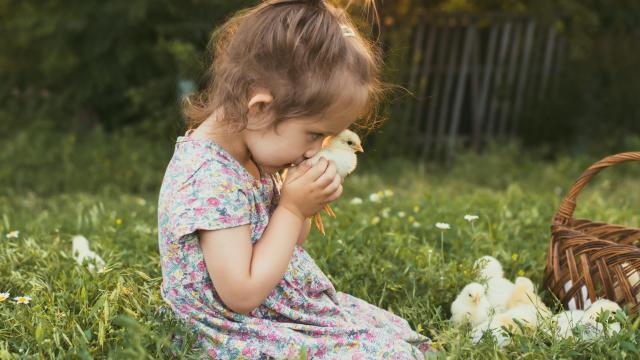Look: we know that we’ve heard a lot from the Centres of Disease Control and Prevention (CDC) in the US over the past year. What were they supposed to do? We’ve been living during a global pandemic caused by a virus never-before-seen in humans, and we all had/have a lot to learn.
But this week, the CDC addressed a different type of social distancing, which, apparently, is enough of a problem that the agency decided that it warranted its own investigation. We’re talking, of course, about poultry snuggling. No, that’s not a typo (although poultry smuggling is a problem, too). Here’s what to know.
Chickens are not for cuddling
Currently, there are Salmonella outbreaks reported in 43 US states, which, as of May 20th, has resulted in 163 illnesses and 34 hospitalizations. “You can get sick from touching your backyard poultry or anything in their environment and then touching your mouth or food, and swallowing Salmonella germs,” the CDC explains in their investigation notice. And yes, “touching” includes kissing or cuddling your poultry.
If this whole thing sounds familiar, that’s because the CDC issued a nearly-identical warning exactly one year ago (almost to the day). And apparently, we didn’t learn our lesson.
To help people with what they term “backyard flocks” stay safe from Salmonella, the CDC has issued these guidelines:
Wash your hands
We should already be quite used to frequently hand-washing by now, but the CDC has some poultry-specific instructions: “Always wash your hands with soap and water immediately after touching backyard poultry, their eggs, or anything in the area where they live and roam.” If there’s not a sink nearby, the CDC suggests using hand sanitizer, and keeping some in the coop so it’s always handy.
Practice safe poultry-handling
The best way to prevent the spread of poultry-transmitted infections is to refrain from high-risk fowl behaviour. “Don’t kiss or snuggle backyard poultry, and don’t eat or drink around them,” the CDC explains. “This can spread Salmonella germs to your mouth and make you sick.”
Keep an eye on the (human) kiddos
Let’s face it: most American schools lack comprehensive poultry safety education. Some children simply aren’t aware that poultry “can carry Salmonella germs even if they look healthy and clean,” according to the CDC.
Make sure that children are supervised when they’re around chickens and ducks. And if you’re a parent, consider having an age-appropriate talk with your kids about being responsible around poultry.

Leave a Reply
You must be logged in to post a comment.